|
|
|
Sort Order |
|
|
|
Items / Page
|
|
|
|
|
|
|
| Srl | Item |
| 1 |
ID:
183958
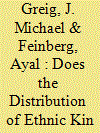

|
|
|
|
|
| Summary/Abstract |
The literature on ethnic kin-groups primarily focuses on their role in perpetuating conflict. Less attention has been devoted to how ethnic kin-groups might encourage mediation in disputes affecting their kin in other nations. We argue that transborder kin-groups’ collective concern for the welfare of their fellow members in other states can motivate interstate mediation efforts. Utilizing the Ethnic Power Relations and the Issue Correlates of War datasets, we examine how transborder kin-group connections shape the likelihood of mediation, as well as who provides it. Our findings suggest that the deeper the network of transborder kin-group connections among target states of territorial disputes, the more likely mediation is to occur. Alternatively, challenger transborder kin-group connections reduce the likelihood of mediation. While transborder kin-group connections help explain the likelihood of mediation, mediation is often not provided by the connected third-party state. Instead, these connections promote mediation from international organizations, particularly regional organizations.
|
|
|
|
|
|
|
|
|
|
|
|
|
|
|
|
| 2 |
ID:
020793
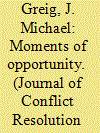

|
|
|
|
|
| Publication |
Dec 2001.
|
| Description |
691-618
|
|
|
|
|
|
|
|
|
|
|
|
|
|
|
|
| 3 |
ID:
137066


|
|
|
|
|
| Summary/Abstract |
Civil conflicts constitute one of the most significant threats to human security. Understanding when belligerents are willing to undertake conflict management efforts is an important first step in better understanding how civil conflicts can be dealt with by the international community. In this article, I examine the occurrence of mediation in low-intensity conflicts. Drawing on insights from the war termination literature, I develop a theoretical argument that links mediation in low-intensity conflicts to the evolution of fighting. I argue that, while the characteristics of a conflict and its belligerents influence when mediation happens, how events unfold on the battlefield also influences the occurrence of mediation. I test this argument by looking at low-intensity conflicts in Africa from 1997 to 2004 using data on mediation in low-intensity conflicts and battle-level civil conflict events. The analysis highlights the important effect of battlefield outcomes and locations upon the occurrence of mediation in low-intensity conflicts.
|
|
|
|
|
|
|
|
|
|
|
|
|
|
|
|
| 4 |
ID:
084029
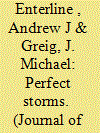

|
|
|
|
|
| Publication |
2008.
|
| Summary/Abstract |
What explains variation in domestic political instability in polities imposed by foreign powers? We formulate a framework grounded in four sources of political instability in imposed polities: (1) the initial conditions under which a polity is imposed, (2) policy choices made by the imposer, (3) the prevailing domestic conditions within states hosting the imposed polity, and (4) the international environment within which the host state is embedded. Employing a sample of ninety-four imposed polities during the period 1816-1994 to test expectations from the framework, we find, in part, that ethnoreligious heterogeneity coupled with democratic institutions, preimposition military defeat, colonial experience, dissimilarity of neighboring political institutions, hostility from neighboring states, and the presence of the imposing state each stimulate political instability. The analysis suggests a bleak prognosis for domestic peace in postinvasion Afghanistan and Iraq as the causal factors that militate against domestic stability are manifold and likely reinforcing.
|
|
|
|
|
|
|
|
|
|
|
|
|
|
|
|
| 5 |
ID:
165677
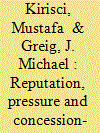

|
|
|
|
|
| Summary/Abstract |
This article examines the forces that encourage targets and challengers involved in claim disputes to offer concessions first. Our framework focuses upon reputation and pressure as key forces that can influence concession-making by claim dispute targets and challengers. We argue that past concession behavior both inside and outside of a claim dyad influences the willingness to make concessions, but does so in distinct ways. We also argue that pressure arising from internal conflict within the disputants and from major power involvement in managing the dispute, also influences the occurrence of concession-making. The results of our hazard analysis show that states involved in claim disputes do consider their opponent’s previous concession-making behavior. Our findings point clearly to the history of concessions within the dyad as a key influence on subsequent concession-making and that major power involvement increases the likelihood of concession-making by both challengers and targets.
|
|
|
|
|
|
|
|
|
|
|
|
|
|
|
|
| 6 |
ID:
133151
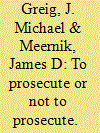

|
|
|
|
|
| Publication |
2014.
|
| Summary/Abstract |
The International Criminal Court (icc) came into force in July 2002 with the potential to drastically alter both the war fighting and peacemaking behavior of states. The icc is designed to try and subsequently punish those found guilty of war crimes, crimes against humanity, and genocide. Supporters of the icc have argued that its establishment will erode the norm of impunity that state and military leaders have historically enjoyed. Yet, another logic suggests that the initiation of an icc investigation or the issuance of an arrest warrant for individuals embroiled in an ongoing dispute may make matters worse. Such individuals may see little reason to stop fighting and reach a settlement if conflict resolution results in their detention in The Hague. Indeed, suspected war criminals and their patrons may wish to escalate their violence in order to avoid showing any sign of weakness or possibility of capitulation lest their enemies press the fight or their rivals seek to undermine their authority. In this article, we explore the potential impact of the icc on the likelihood of peace by examining the impact of actions by the icc - the initiation of investigations into conflict situations and the issuance of arrest warrants for those suspected of committing violations of international law - on the likelihood of mediation. Our findings suggest that while icc arrest warrants can encourage mediation, the initiation of investigations by the icc can actually undermine the occurrence of mediation.
|
|
|
|
|
|
|
|
|
|
|
|
|
|
|
|
|
|
|
|
|